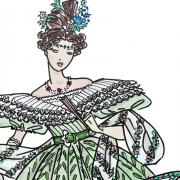When you're scribbling a message to catch the last post, beware-you're giving away clues to the real you! Emma Lee meets Patricia Field.
Signing your life away
When you are scribbling a letter to catch the last post, beware- you're giving away clues to the real you! Emma Lee meets Patricia Field, the Nofolk woman who can read between the lines.
pictures: Denise Bradley
You hear the clatter of the letterbox and the thud of the morning post landing on your doormat. Scanning through the pile of envelopes you spot a letter with handwriting you recognise. Before you even open it, you know it’s from your favourite auntie. Her dispatches always bring a smile to your face, so you pop the kettle on for a brew before sitting down to read it. You may not realise it, but you’ve just been practising elementary graphology – the study of handwriting.
In our hi-tech age, where much of our communicating is done via e-mail or text message, it’s becoming less and less common to see handwriting. Christmas, when millions of cards are sent and received, is an exception to the rule. Like your fingerprints, your handwriting is something which is unique to you. At its most basic level, it identifies you. But take a closer look and it can give away your personality – whether you’re shy or outgoing, practical or a dreamer, a follower or a leader, even if you’re feeling a bit tired or stressed. The trained eye can tell all that from simple things like the way your writing slopes, the size of the letters and how hard you press down on the paper.
It’s a subject which fascinated Patricia Field so much that she turned it into a career. The 62-year-old from Shipdham, who is a member of the British Institute of Graphologists, works as a consultant and teacher, providing analyses for businesses (it’s a useful tool in choosing job candidates and team building) and individuals. Graphology dates back to the 1800s and Patricia’s interest was piqued when her own handwriting style changed – she started writing the letter “e” differently and she wanted to know why. “I found out I was going through a transition in the way I processed information,” she says. “For me it was that I was not meant to take everything that was said to me without questioning it. And I hadn’t realised I had been doing that.”
When Patricia analyses handwriting what clues does she look for?
“It’s about the use of the paper as much as it’s about the writing,” she says. “You look at the movement, how it’s formed and how it’s arranged. Then you start to look at the minor details. Nothing stands alone in handwriting, it has to be viewed as a whole.“For example, slant is an indication of emotional responses – love, anger, hate, etc – and it will depend what else is in the writing.”
According to Patricia, right slanting handwriting is usually the indication that someone’s friendly and outgoing, with a need to be involved with others. If your writing’s upright you’re more composed than a right slanted writer, though possibly charming and objective in outlook. And if your writing tends towards the left, a sensitivity underpins reactions to people and situations.
Does Patricia ever find herself analysing her family and friends’ cards?“No, it’s like being a plumber. The last thing you want to do when you get home is mend the leaky tap,” she laughs.
Patricia Field runs regular handwriting analysis workshops and is available for consultations. For information phone 01362 822112 or visit www.analyse-handwriting.co.uk
Can you really accurately deduce somebody’s personality from the way they wield a pen? We asked Norfolk consultant graphologist Patricia Field to analyse three samples of handwriting. She’d never met the writers – all she was given was six lines of script.
Tara Greaves
Patricia says: “There is a depth of feeling concealed beneath a sense of calmness. She relates well to others but can be cautious, thinking before she speaks. Tara tends towards social conventionality and is likely to be concerned with appearance and formality. She is drawn to, and feels more comfortable with, like-minded people, though she seeks individual recognition at the same time. Given a task, she will prefer to weigh up things carefully, consolidating facts on which she will base her ultimate decisions. For the sake of harmony, she is prepared to concede in situations she feels she cannot control.”
Tara’s verdict: “I wish I did think more before I open my mouth to speak sometimes, but the rest of the statement is spot on. I think, outwardly, I do appear calm and although I am not so concerned with appearance I do like the formality of certain situations. I definitely like to have all the facts before making a decision.”
Mark Guest
Patricia says: “Mark’s approach to life is pragmatic. He relies on impressions or observation when it comes to problem solving, rather than a lengthy systematic approach. He is someone who doesn’t express his emotions freely. Unless by nature he is pessimistic, at the time of writing he either felt tired or run down. Mark appears not to take things too seriously and is able to see irony in situations. As a strategy to deflect feelings of inadequacy or lack of confidence he uses wit and humour. Others meeting him for the first time might not realise this, as his (formal) signature suggests confidence.”
Mark’s verdict: “I am quite pessimistic at times but, also, I wrote my piece after work so I was tired. I think the thing about the humour is bang on as I have always felt quite low in confidence and found that humour covered it best. Also, people who meet me often seem to think I’m confident, not shy.”
Sarah Hardy
Patricia says: “Sarah likes to stick to essentials and can be emphatic about decisions, taking any necessary action to back up her beliefs. With the courage of conviction she may like to have the last word too. Maybe as a result of feeling over-managed in early life, Sarah shows an independent streak, with a strong desire to think and do things for herself. Sarah likes to get things right and can be impatient both with herself and others. She can be affected by moods and has to guard against feeling thrown off balance. Her positive attitude, which gets things done, helps her maintain some equilibrium.”
Sarah’s verdict: “As you’d imagine, I see some but not all of myself in this. Sadly, I wasn’t over-managed in my early life – I had a great deal of freedom which obviously developed into a sense of independence, some would say, a desire to have the last word! But I like the bit about a positive attitude – with two young children, a husband who can be a stranger to housework and a challenging job, it has become something of a necessity!”


























